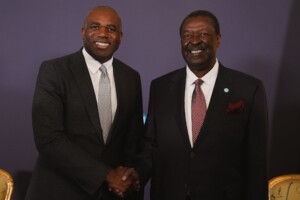Sudan to share govt posts with rebel leaders
The Sudanese government has reached an understanding with the armed movements about power-sharing on the highest level. Three state governors resigned this week. PM Abdallah Hamdok will announce changes in the government and the security forces in the country within the coming 14 days.
 Lt Gen Abdelfattah El Burhan, Chairman of the Sovereign Council, receives the South Sudan peace mediators and delegation of rebel leaders, Khartoum, June 27 (SUNA)
Lt Gen Abdelfattah El Burhan, Chairman of the Sovereign Council, receives the South Sudan peace mediators and delegation of rebel leaders, Khartoum, June 27 (SUNA)
The Sudanese government has reached an understanding with the armed movements about power-sharing on the highest level. Three state governors resigned this week. PM Abdallah Hamdok will announce changes in the government and the security forces in the country within the coming 14 days.
Radio Dabanga learned that the government decisions relate to the long-awaited appointment of civilian governors, “radical changes in the police and security apparatus”, and a cabinet reshuffle. Some ministers may have to leave after evaluation of their performance for nearly a year.
In a pro-active step, the military governors of South Darfur, Maj Gen Hashim Khalid, Northern State, Maj Gen Mohamed El Saouri, and Red Sea state, Maj Gen Hafiz El Taj, resigned on Wednesday and Thursday.
The government and the armed movements who are close to round up the peace negotiations that are mediated by South Sudanese officials in Juba, agreed on replacing three to four federal ministers and two members of the Sovereign Council in favour of the rebels.
In a speech to the Sudanese nation on Monday on the eve of the June 30 March of the Millions, PM Abdallah Hamdok pledged to correct the course of the 39-months transitional period within two weeks, “to put the locomotive of the revolution back on the right track”.
On Tuesday, millions of people demonstrated all over Sudan to commemorate the protestors killed during demonstrations. They demanded civilian rule, better living conditions, and the removal of the remnants of the Al Bashir regime.
The Sudan People’s Liberation Movement-North faction based in Kauda in South Kordofan’s Nuba Mountains under the leadership of Abdelaziz El Hilu (SPLM-N El Hilu) separately joined the peace negotiations. Though no progress has been reported, the rebel group decided on July 1 to extend its unilateral ceasefire until the end of this year. Hamdok has welcomed the decision.
Power-sharing
Since the formation of the transitional government on September 6 last year, the Forces for Freedom and Change have been pushing for the replacement of the acting military state governors by civilian governors. The military governors themselves demanded to be relieved, stating that the constitutional vacuum in the states was not in their favour.
In the Juba Declaration of Principles however, signed by Khartoum and rebel leaders in the South Sudanese capital on September 11, it was agreed that the military governors would only be replaced after a comprehensive peace accord has been reached. At that time, it was envisaged that the talks would be concluded in December.
Rebel leader Yasir Arman said in November that if Khartoum appoints civil state governors before the conclusion of a peace accord, they will be replaced after the signing of the agreement.
In end February, Mohamed El Taayshi, member of Sudan’s Sovereign Council and spokesman for the government delegation reported no breakthrough regarding the appointment of civilian state governors and the formation of a new Legislative Council in the peace talks. One-and-a-half month later, the Sudan Revolutionary Front (SRF) rebel alliance rejected the government matrix detailing priorities and responsibilities for the three-year transitional period.
On April 24, Radio Dabanga cited El Taayshi who reported that four new seats would be added to the Sovereign Council in favour of the Darfur armed movements.
It seems however that this idea was dismissed again. Following the conclusion of most of the peace items, the South Sudanese mediators proposed in June to visit Khartoum to discuss the main outstanding power-sharing issues. Therefore, members of the mediation team and a delegation of senior negotiators of the Sudan Revolutionary Front (SRF) rebel alliance arrived in Khartoum on June 25 for direct talks in order to reach a final peace agreement.
The government reacted by offering a final proposal concerning the remaining items, that would be discussed with the Forces for Freedom and Change over the weekend, and be concluded on Monday.
Representation quotas for the rebel groups in the still to be formed Legislative Council will be discussed this weekend.
Radio Dabanga’s editorial independence means that we can continue to provide factual updates about political developments to Sudanese and international actors, educate people about how to avoid outbreaks of infectious diseases, and provide a window to the world for those in all corners of Sudan. Support Radio Dabanga for as little as €2.50, the equivalent of a cup of coffee.












 and then
and then